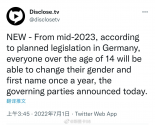@pmc Could you do a defense of Germanic Engineering ™ for us?
China is steadily wiping out German industry
National strategy that defined Angela Merkel era has run its course
Diana Choyleva
June 30, 2022 17:00 JST
Diana Choyleva is chief economist of Enodo Economics, a macroeconomic and political forecasting company in London.
If there was ever a symbiosis between Germany and China, that time has passed. Germany is slowly but surely realizing that a national industrial strategy based on synergy with China is headed toward a dead-end.
The partnership that defined Angela Merkel's years as chancellor will not outlive her administration by long. In fact, the partnership is already in its death throes. What remains now is for German business leaders and politicians to define what will replace it.
For almost two decades, the synergy between China and Germany worked. China contributed low wages and input costs. Germans contributed technical know-how and the fruits of decades of engineering breakthroughs and research. Young Chinese workers got jobs. Aging German investors got profits.
But in the end, Germany has lost out to China's manufacturing prowess. China's auto industry is surpassing Germany's, certainly in size and soon, perhaps, in quality. China's relentless focus on digitalization and other emerging technologies is reducing its dependence on a rival whose manufacturing and engineering heyday was in the 1970s.
Original analysis by Enodo Economics shows that Beijing's "Made in China 2025" industrial policy has done exactly what critics warned it would. It has empowered new niche players with the potential to displace the mid-size specialty manufacturers that are the heart and soul of the German economy.
Over a decade ago, the sudden emergence of Chinese competitors wiped out Germany's advanced solar power industry. Now, that experience is likely to repeat across a broad spectrum of industries.
Meanwhile, China is moving relentlessly into the new strategic technologies of the future artificial intelligence, electric vehicles and the digitization of the economy. We do not know yet whether Beijing's top-down model of statist industrial policy will achieve all of its goals, but we do know that in these fields, China has no need to look to Germany for investment or technology.
The hollowing out of German industry might paradoxically have led to a greater focus on China, as German companies squeezed the remaining profits out of their biggest market. That, in turn, would have kept Europe as a balancing player in the growing divergence between the U.S. and China. But the Russian invasion of Ukraine earlier this year has changed the calculation by ensuring that Germany stays within the U.S. sphere of influence during the great decoupling.
Strategically, Germany can no longer afford to mollify an expansionist Russia. Economically, it can no longer afford to muddle along in a partnership with China which will inevitably sap its own industrial strength. The lines of what it cannot do are increasingly clear; it remains to define what it will do.
A Germany that aligns itself with the U.S. will have to disentangle from two fatal dependencies: dependency on its Russian energy imports and dependency on its China joint ventures. Chancellor Olof Schulz has already taken some steps to detach from Russia, thanks to the war in Ukraine.
As for corporate decoupling, there are models out there. Every industrial country has had its China epiphany during the past decade, the moment when its businesses realize that they cannot afford to put all their eggs in the China basket.
State-backed nationalist protests in China persuaded Japanese and South Korean companies that they needed a "China plus one" strategy; the result was new production centers in Southeast Asia.
Taiwanese businesses began investing elsewhere as soon as labor costs tipped up in China. The Trump tariffs pushed American industry, kicking and screaming, into seriously considering supply chain diversification.
French and British companies have tried diversifying markets rather than production. Their "third country" approach involves selling products manufactured at their China-based joint ventures into developing countries, in effect, using the China cost structure to access new projects and deals in new markets.
German companies came late to their epiphany. Disruptions caused by the COVID lockdowns of 2020 and 2022 forced the first real rethink.
A second shock came last month when Berlin refused to renew investment guarantees for Volkswagen's controversial assembly plant in Xinjiang, where about one million people, mostly Uighurs, have been forced into "re-education" camps. Volkswagen says there is no forced labor at its factory near Urumqi, the capital of the Xinjiang region, and no one has produced evidence of any.
Berlin's broader point is that it will no longer write blank checks for German companies to invest in the rival that is eroding German strength and supporting Russia's invasion of Ukraine.
I have argued for some time that investors need to prepare for the great decoupling and Europe's coming divergence with China on every front: political, economic and strategic. This is true for Germany more than anywhere.
It is not enough to say enough about industrial strategies that no longer serve Germany well; a new strategy is needed. German industry is unlikely to fully adopt either the China plus one or the third country models.
Instead, the first step should be to invest in the technologies and modern practices that would allow German companies to once again confidently occupy the vanguard of their fields. Investors will reward those who succeed.



